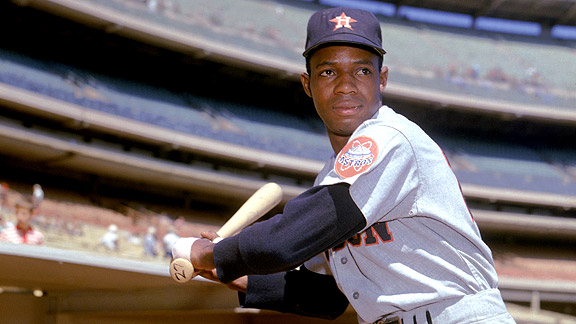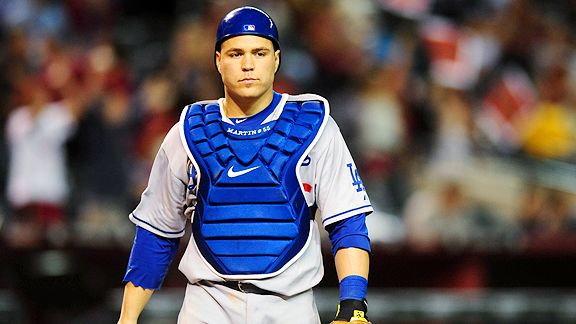Month: December 2010 (Page 4 of 4)

Louis Requena/MLB Photos/Getty ImagesJimmy Wynn played 11 seasons in Houston before coming to the Dodgers.
Former Dodger Jimmy Wynn recently came out with his autobiography. David Laurila of Baseball Prospectus has a good interview with him. Some excerpts:
DL: In the book, you talk about how the South wasn’t yet fully integrated when you were in the minor leagues.
JW: That’s so true. There were certain areas in Florida and the Florida State League where I played my first professional season [in 1962]… there were certain places in Florida that didn’t cotton to a black ballplayer playing in a white sport. Of course at that time, you know, I was called all kinds of names. I’m just fortunate that I wasn’t prejudiced at that time—and I’m not prejudiced now—and I was very fortunate that my father taught me the etiquette of being who you are and staying with that concept. I’ve lived with that concept for years and years now, and I’ve never deviated from that.
One of the things about the different name-callings that happened in Florida was that I had two great managers. One was Hershell Freeman, who did everything possible to make sure that I wasn’t hurt from the name-calling. He defended me a great deal. The other was Johnny Vander Meer, who everybody knows about because of the two no-hitters back-to-back. I had two great guys who I respected a great deal, and they were more or less like father figures to me. …
DL: In the book, you say that you lost the 1967 home-run crown to “the greatest legitimate career home-run hitter of all time.”
JW: Yeah, so to speak. I lost it and Hank [Aaron] and I became really good friends, mainly because of what he said to me. He called me and told me that he was going to sit out the last game of the season, and him and I would be the co-home-run champions of the National League. I said that I would love that, but that something was going to happen. And it did. I think the commissioner of baseball found out that Hank was going to sit out the last game and he didn’t want him to, and he called Hank and told him he had to play. Consequently, Hank played and hit two home runs, and I didn’t, and he became the home-run champion. He said that Jimmy Wynn should be the home-run hitting champion, because of the Astrodome. That made me feel good. It was nice for me to be No. 2, because of all the great home-run hitters at that particular time. …
DL: How did a man your size hit a baseball so far?
JW: I drank a lot of milk.
* * *
Jamie Moyer is 20 years younger than Jimmy Wynn, though you could be forgiven for thinking they once played against each other. Moyer recently had Tommy John surgery, with the hope of returning to the majors in 2012 and pitching at age 49. I made a joke the other day that his fastball might clock in with the same two digits, but truth be told, I’m past the point of doubting Moyer’s longevity. I’d love to see him pitch at 50.
* * *
- Baseball-Reference.com is hosting a vote on the expansion committee candidates for the Hall of Fame. Cast your ballot.
- The Dodgers would have made the playoffs in 2000 and 2002 if MLB had instituted a second wild-card team sooner, writes David Brown of Big League Stew. The 1997 Dodgers, in theory, would have needed a tiebreaker game with the Mets.
Been pretty busy lately, no? And it only might get busier …
- Reminder: 9 p.m. Thursday is the deadline for the Dodgers to offer a 2011 contract to pre-free agents like Russell Martin. Doug Miller of MLB.com has more. In case you don’t understand why Martin might be non-tendered, Miller explains: “According to the Basic Agreement, when teams tender contracts, they can’t cut any more than 20 percent of what a player earned in salary and performance bonuses the previous season, or 30 percent of those figures during the past two seasons. Non-tendered players, however, can be re-signed by their teams at larger cuts.”
- Just how scrappy a ballplayer have the Dodgers given up in Ryan Theriot? Matt Sebek of JoeSportsFan’s Tailgate runs the analysis. (via Hardball Talk).
- Former Dodger pitcher Eric Stults signed a minor-league contract with Colorado. “The Dodgers sold Stults’ rights to the Hiroshima Toyo Carp in Japan at the end of Spring Training 2010, and Stults went 6-10 with a 5.07 ERA in 21 games,” writes Thomas Harding of MLB.com. “Stults, who turns 32 on Dec. 9, would be paid at a $435,000 rate if he makes the Majors, but the contract also allows him to re-sign with Hiroshima if he doesn’t make the big league roster.”
- Making the case to scrap draft-pick compensation for free-agent signings is Dave Cameron of Fangraphs.
- Jerry Crasnick of ESPN.com writes movingly about Padres pitcher Kevin Correia coping with his brother’s death this summer.
- Fifty years ago, Frank Finch of the Times looked at the Dodgers’ youth movement, to be led by Willie Davis, Tommy Davis, Frank Howard … and Charley (Charlie) Smith. (via Keith Thursby of the Daily Mirror).
- Josh Fisher’s latest Dodger Divorce take on the McCourts:
… Frank McCourt’s primary position has been that the Dodgers must stay in the family. Naturally, he is confident that McCourt ownership is also good for the Dodgers and, by extension, the community. While he might have come to Los Angeles an outsider, I strongly believe that Frank has come to regard the Dodgers as much more important than 24 acres of Boston seafront property ever were. And I wonder if yesterday’s release is a sign that he is concerned about his chances of keeping the Dodgers in the family.
I still think Jamie got what she wanted in the MPA. I can’t look at her initial public statements in the divorce and conclude that she had any idea that the documents had been switched–that she had any idea there existed an Exhibit A making the Dodgers anything but Frank’s separate property. And I can’t help but think that, despite her apparent unfamiliarity with marital property laws in Massachusetts and California, and despite the ugly chain of events leading up to the MPA’s execution and subsequent modification, Jamie didn’t have enough in the way of background and intelligence to at least question the document when she reviewed its terms.
For all that, though, Jamie’s case is strong. Strong enough, perhaps, that Frank’s inability to prove his facts is more important than Frank’s facts as they actually occurred. Strong enough that most observers considered Jamie to be in the lead after the trial. Strong enough that Jamie turned down what was surely a well-reasoned, thorough settlement proposal crafted by a well-respected mediator. Strong enough, basically, that the McCourt with the most to lose is ready to roll the dice.




